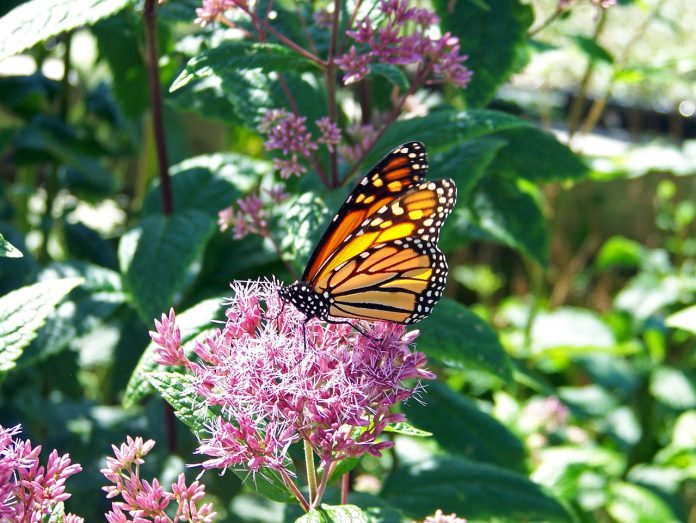By Linda K. Schneider | Medina Soil and Water Conservation District
Monarch butterflies are in trouble, but did you know that all our native pollinators are in trouble: bees, hummingbirds, butterflies, moths, skippers, flies and beetles.
Pollinators help produce food including apples, almonds, pears, blueberries, tomatoes, squash and more. Over 150 food crops in the United States depend on pollinators.
That is one good reason to turn lawns into wildflower meadows, and the Medina County Soil and Water Conservation District is doing just that.
Pollinator habitat
Medina County Commissioners gave permission to turn three acres of lawn at the office on Route 162 into a native pollinator habitat. This past December, four plots were frost seeded with wildflower meadow mix, wet meadow mix, tall grass prairie mix and short grass prairie mix. A fifth plot is a rain garden, installed in September with small plants. Each plot will attract different pollinators.
County residents can adapt pollinator habitats to the size of their property; native flowers can be planted in a small patch in a backyard or large open areas. Find ideas for your own yard including: build a butterfly garden, add native plants for hummingbirds, put up a mason bee house, add a wild patch or plant a rain garden.
Yearly visitors
You might be amazed by the different visitors that will make appearances throughout the year. May to October you will see butterflies, bees, hummingbirds and moths. Monarchs come to Ohio in mid-summer and back again in September on their way to the wintering grounds in Mexico. Native bees are active from spring until frost. Hummingbirds visit Northeast Ohio from Mother’s day to September. Moths are our nighttime pollinators.
Planting a variety of native trees, shrubs and wildflowers will attract many more pollinators since specific pollinators are adapted to specific plants. In general, bees and butterflies drink the nectar from blossoms while caterpillars eat leaves of host plants.
Both generalists and specialists exist. An example of a specialist is the monarch caterpillar — they eat only milkweed leaves. A spicebush swallowtail caterpillar (Papilio Troilus) eats the leaves of the spicebush shrub.
Stormwater runoff
In addition to helping pollinators; native plantings reduce stormwater runoff. Strategically placing deep-rooted prairie plants will slow down stormwater as it is being filtered and allowed to soak into the ground. Some grasses have deep roots that go nineteen feet down into the soil. Imagine how much stormwater that grass is soaking up.
Come visit the prairie at the Medina County SWCD office. Spring will show a few flowers; however, it takes about three to five years for a habitat like this to mature. Stop by often, as new flowers bloom each month, new native pollinators will arrive. This is a rare opportunity to watch a habitat come alive.
An educational outdoor classroom is a valuable resource for Medina County residents, teachers and students to view, photograph and record plants and pollinators. Next steps will include educational signs, trees, benches and tables, as funding is secured.
Funding for this project has come from private donations and grants. Western Reserve Land Conservancy and Dominion Energy are the grantors. Partners in this project include Medina County Soil and Water Conservation District, Medina County Park District, Medina County Building Maintenance Department, Medina County Highway Department and National Wildlife Federation.
For more information, contact Medina County Soil and Water Conservation District at 330-722-9322 or visit the website at www.medinaswcd.org.
(Linda K. Schneider is the education coordinator for the Medina Soil and Water Conservation District.)
Related Content
- Garden cleanup: How to help overwintering pollinators
- How to set up a water source for bees
- How to create a bee lawn
- How to help wild bees this summer
- How to plant a prairie garden
- How to garden for pollinators
- How to plant a hummingbird garden
- How to create a butterfly garden
- How do I attract native bees to my yard and garden?













